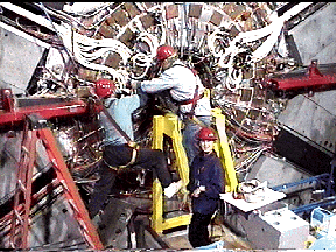
SCIPPers installing the vertex detector at BaBar

Within the BaBar experiment, mounted by an international collaboration of approximately 500 physicists, SCIPP physicists have contributed to the design and readout of the two tracking devices which accurately reconstruct the momentum, trajectory, and point of origin of charged particles originating from B meson decays. In particular, SCIPP physicists have designed custom readout integrated circuitry for the tracking system, and were responsible for the data transmission from one of the tracking detectors. In addition, SCIPP physicists have made leading contributions to the BaBar simulation software, as well as the overall analysis software structure.
Now that BaBar is a running experiment, SCIPP efforts have turned towards data analysis. In addition to CP violation measurements, SCIPP physicists are active in searches for matter/antimatter oscillations in the charmed quark system, as well as measurements of rare decay modes of the B meson which are mediated by exotic `penguin' processes, both of which can hope to shed light on possible new states and interactions beyond the Standard Model, and which are nicely complementary to CP violation studies.
The BaBar effort is one of the largest efforts within SCIPP, comprising approximately 15 physicists, divided roughly equally between senior physicists, post-doctoral fellows, and graduate students.
SCIPP contact: Bruce Schumm